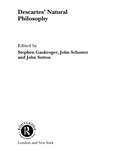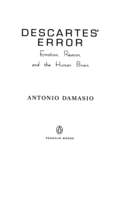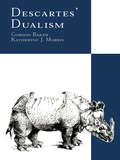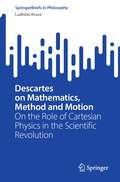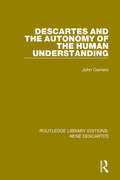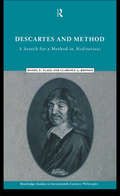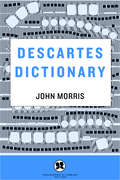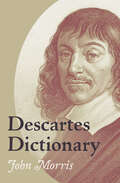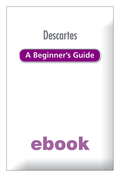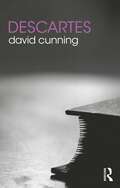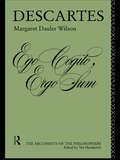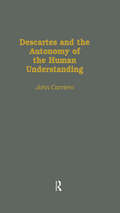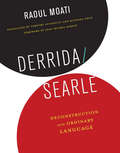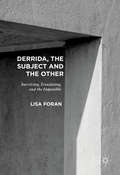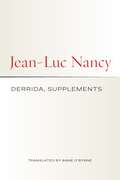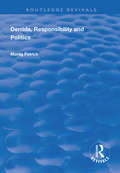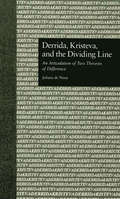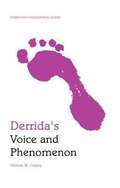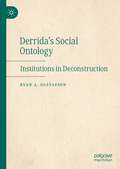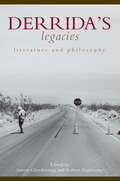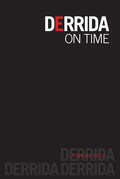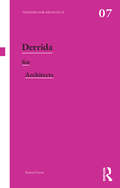- Table View
- List View
Descartes' Natural Philosophy (Routledge Studies in Seventeenth-Century Philosophy #Vol. 3)
by John Schuster Stephen Gaukroger John SuttonThe most comprehensive collection of essays on Descartes' scientific writings ever published, this volume offers a detailed reassessment of Descartes' scientific work and its bearing on his philosophy. The 35 essays, written by some of the world's leading scholars, cover topics as diverse as optics, cosmology and medicine, and will be of vital interest to all historians of philosophy or science.
Descartes' Meditations
by Karen DetlefsenDescartes's Meditations, one of the most influential works in western philosophy, continues to provoke discussion and debate. This volume of original essays by leading established and emerging early modern scholars ranges over all six of the Meditations and explores issues such as scepticism, judgement, causation, the nature of meditation and the meditator's relation to God, the nature of personhood, Descartes' theory of sense perception, and his ideas on the nature of substance. The contributors bring new insights to both central and less-studied topics in the Meditations, and connect the work with the rich historical and intellectual context in which Descartes forged his thought. The resulting volume will appeal to a wide range of scholars of early modern thought.
Descartes' Error: Emotion, Reason, and the Human Brain (Drakontos Ser.)
by Anthony DamasioSince Descartes famously proclaimed, "I think, therefore I am," science has often overlooked emotions as the source of a person's true being. Even modern neuroscience has tended, until recently, to concentrate on the cognitive aspects of brain function, disregarding emotions. This attitude began to change with the publication of Descartes' Error in 1995. Antonio Damasio--"one of the world's leading neurologists" (The New York Times)--challenged traditional ideas about the connection between emotions and rationality. In this wondrously engaging book, Damasio takes the reader on a journey of scientific discovery through a series of case studies, demonstrating what many of us have long suspected: emotions are not a luxury, they are essential to rational thinking and to normal social behavior.
Descartes' Dualism: Null
by Gordon Baker Katherine MorrisWas Descartes a Cartesian Dualist? In this controversial study, Gordon Baker and Katherine J. Morris argue that, despite the general consensus within philosophy, Descartes was neither a proponent of dualism nor guilty of the many crimes of which he has been accused by twentieth century philosophers.In lively and engaging prose, Baker and Morris present a radical revision of the ways in which Descartes' work has been interpreted. Descartes emerges with both his historical importance assured and his philosophical importance redeemed.
Descartes on Mathematics, Method and Motion: On the Role of Cartesian Physics in the Scientific Revolution (SpringerBriefs in Philosophy)
by Ladislav KvaszThis book argues that Descartes’ physics was a milestone on the road to modern mathematical physics. After Newton introduced a completely different approach to mathematical description of motion, Descartes’ physics became obsolete and even difficult to comprehend. This text follows the language of Descartes and the means of which motion can be described. It argues that Descartes achieved almost everything that later Newton was able to do—to describe the motion of interacting bodies- by different (i.e. algebraic) means. This volume completely refutes the received view according to which Descartes’ physics was merely a kind of discursive natural philosophy. To make this interpretation more plausible the book follows Descartes’ ideas from his early work in mathematics, through his invention of the analytic method towards his mature physics. It shows that Descartes followed a similar heuristic pattern.The volume appeals to students and researchers; it invites the reader equippedwith minimal understanding of college mathematics to follow Descartes on his intellectual journey through the Scientific Revolution. The reader will gain a deeper understanding of the role of mathematical language in the creation of modern physics and a glimpse into the fascinating world of Descartes’ scientific thought. Several of Descartes’ philosophical ideas can be traced back to his scientific interests and thus the book elucidates the motivation behind some of Descartes’ key positions in the area of epistemology and method. In the penultimate chapter the book presents four arguments in favor of seeing Descartes as a physicist on par with Galileo and Newton.
Descartes and the Autonomy of the Human Understanding (Routledge Library Editions: Rene Descartes)
by John CarrieroThis volume, originally published in 1990, delineates the transition Descartes effects from a prevalent medieval conception of understanding to a modern conception of it. Through the examination of the continuities and discontinuities between Descartes’ account of the understanding and that of high scholasticism, a characterization emerges of two way in which the understanding is autonomous in Descartes’ view. These two sorts of autonomy shed light on the origin of a set of related concerns that give modern philosophy its coherence, setting it apart from medieval philosophy as a distinct tradition. The first sort – the independence of the understanding of the senses – creates the modern problem of scepticism with regard to the external world. The second sort, concerning the ontological status of the mind, provides the background against which modern discussions of the mind/body problem take shape.
Descartes and Method: A Search for a Method in Meditations (Routledge Studies in Seventeenth-Century Philosophy #Vol. 2)
by Daniel E. Flage Clarence A. BonnenRene Descartes credited his success in philosophy, mathematics, and physics to the discovery of a universal method of inquiry, but he provided no systematic description of his method. Descartes and Method carefully examines Descartes' scattered remarks on his application and puts forward a systematic account of his method with particular attention to the role it plays in the Meditations.Daniel E. Flage and Clarence A. Bonnen boldly and convincingly argue against the orthodox conception that Descartes had no method. Through a rigorous and thorough examination, Flage and Bonnen unearth and explain the role of the method of analysis in the Meditations.Descartes and Method is a ground-breaking book that is sure to make a considerable impact on the philosophy community. Anyone wishing to gain a new understanding of Descartes's Meditations should read this book.
Descartes Dictionary
by John MorrisThe purpose of this Descartes Dictionary is to bring together as many as possible of the technical and special terms in Descartes' writings with their definitions in Descartes' own words. There are also implicit characterizations of the meanings of many words, and a handful of entries were included simply for their own sake--because Descartes had something interesting to say about his life and world. All of the entries, or almost all of them, have been newly translated for this volume. There are many reasons for preparing new translations: the language in the older translations is archaic and often inaccurate; many of Descartes' most important works have never been translated into English; and modern translations vary in quality and style. What is most important, though, is that the old translations simply failed to pay attention to the technical language that Descartes used, and so blurred some of the most important distinctions that he made. Professor Morris is on the faculty of Kirkland College.
Descartes Dictionary
by John MorrisAn accessible guide to understanding many of the complex technical and special terms implemented by the seventeenth-century philosopher. French philosopher René Descartes authored many works in his lifetime like Discourse on the Method and Principles of Philosophy. But while his &“I think, therefore I am&” may be easy to grasp, much of the terminology he uses can be challenging. Descartes would frequently introduce terms in his writings without explanation, and if there were such a definition, it is in one of his letters or an obscure, unpublished work. In Descartes Dictionary, author John M. Morris collects as many as possible of the technical and special phrases Descartes employed in his writings along with their definitions in Descartes&’s own words. This volume is a great companion book for anyone studying the philosopher&’s works and will certainly enrich their understanding.
Descartes A Beginner's Guide (ABEG)
by Kevin O'DonnellThis useful guide introduces the reader to the so-called 'father of modern philosophy' - Rene Descartes.
Descartes (The Routledge Philosophers)
by David CunningRené Descartes (1596–1650) is well-known for his introspective turn away from sensible bodies and toward non-sensory ideas of mind, body, and God. Such a turn is appropriate, Descartes supposes, but only once in the course of life, and only to arrive at a more accurate picture of reality that we then incorporate in everyday embodied life. In this clear and engaging book David Cunning introduces and examines the full range of Descartes’ philosophy. A central focus of the book is Descartes’ view that embodied human beings become more perfect to the degree that they move in the direction of finite approximations of independence, activity, immutability, and increased knowledge. Beginning with an introduction and a chapter on Descartes’ life and works, Cunning also addresses the following key topics: Descartes on the wonders of the material universe skepticism as epistemic garbage, and the easy dissolution of hyperbolic doubt Descartes’ three arguments for the existence of God the ontology of possibility and necessity freedom and embodiment arguments for the immateriality of mind sensible bodies and the pragmatic certainty by which to navigate them Descartes’ stoic view on how best to live. Descartes is an outstanding introduction to one of the greatest of Western philosophers. Including a chronology, suggestions for further reading, and a glossary of key terms, it is essential reading for anyone studying Descartes and the history of modern philosophy.
Descartes (Arguments of the Philosophers)
by Margaret Dauler WilsonOne of the most significant studies of Descartes in recent times. It concentrates on the Meditations to show Descartes' philosophy in the context of his overall scientific objectives, not all of them fully explicit in the texts.
Descartes & the Autonomy of the Human Understanding (Harvard Dissertations in Philosophy)
by John CarrieroThis volume, originally published in 1990, delineates the transition Descartes effects from a prevalent medieval conception of understanding to a modern conception of it. Through the examination of the continuities and discontinuities between Descartes' account of the understanding and that of high scholasticism, a characterization emerges of two way in which the understanding is autonomous in Descartes' view. These two sorts of autonomy shed light on the origin of a set of related concerns that give modern philosophy its coherence, setting it apart from medieval philosophy as a distinct tradition. The first sort - the independence of the understanding of the senses - creates the modern problem of scepticism with regard to the external world. The second sort, concerning the ontological status of the mind, provides the background against which modern discussions of the mind/body problem take shape.
Descartes
by John Cottingham Robert StoothoffPhilosophy is one of the most intimidating and difficult of disciplines, as any of its students can attest. This book is an important entry in a distinctive new series from Routledge:The Great Philosophers. Breaking down obstacles to understanding the ideas of history's greatest thinkers, these brief, accessible, and affordable volumes offer essential introductions to the great philosophers of the Western tradition from Plato to Wittgenstein. In just 64 pages, each author, a specialist on his subject, places the philosopher and his ideas into historical perspective. Each volume explains, in simple terms, the basic concepts, enriching the narrative through the effective use of biographical detail. And instead of attempting to explain the philosopher's entire intellectual history, which can be daunting, this series takes one central theme in each philosopher's work, using it to unfold the philosopher's thoughts.
Derrida/Searle: Deconstruction and Ordinary Language
by Raoul MoatiRaoul Moati intervenes in the critical debate that divided two prominent philosophers in the mid-twentieth century. In the 1950s, the British philosopher J. L. Austin advanced a theory of speech acts, or the "performative," that Jacques Derrida and John R. Searle interpreted in fundamentally different ways. Their disagreement centered on the issue of intentionality, which Derrida understood phenomenologically and Searle read pragmatically. The controversy had profound implications for the development of contemporary philosophy, which, Moati argues, can profit greatly by returning to this classic debate. In this book, Moati systematically replays the historical encounter between Austin, Derrida, and Searle and the disruption that caused the lasting break between Anglo-American language philosophy and continental traditions of phenomenology and its deconstruction. The key issue, Moati argues, is not whether "intentionality," a concept derived from Husserl's phenomenology, can or cannot be linked to Austin's speech-acts as defined in his groundbreaking How to Do Things with Words, but rather the emphasis Searle placed on the performativity and determined pragmatic values of Austin's speech-acts, whereas Derrida insisted on the trace of writing behind every act of speech and the iterability of signs in different contexts.
Derrida/Searle
by Jean-Michel Rabaté Timothy Attanucci Maureen Chun Raoul MoatiRaoul Moati intervenes in the critical debate that divided two prominent philosophers in the mid-twentieth century. In the 1950s, the British philosopher J. L. Austin advanced a theory of speech acts, or the "performative," that Jacques Derrida and John R. Searle interpreted in fundamentally different ways. Their disagreement centered on the issue of intentionality, which Derrida understood phenomenologically and Searle read pragmatically. The controversy had profound implications for the development of contemporary philosophy, which, Moati argues, can profit greatly by returning to this classic debate. In this book, Moati systematically replays the historical encounter between Austin, Derrida, and Searle and the disruption that caused the lasting break between Anglo-American language philosophy and continental traditions of phenomenology and its deconstruction. The key issue, Moati argues, is not whether "intentionality," a concept derived from Husserl's phenomenology, can or cannot be linked to Austin's speech-acts as defined in his groundbreaking How to Do Things with Words, but rather the emphasis Searle placed on the performativity and determined pragmatic values of Austin's speech-acts, whereas Derrida insisted on the trace of writing behind every act of speech and the iterability of signs in different contexts.
Derrida, the Subject and the Other
by Lisa ForanThis book presents the relationbetween the subject and the other in the work of Jacques Derrida as one of'surviving translating'. It demonstratesthe key role of translation in thinking difference rather than identity,beginning with the work of Martin Heidegger and Emmanuel Levinas. It describes how translation, and its ethicaldemands, acts as a leitmotif throughout Derrida's writing; from his early work on Edmund Husserl to his lasttexts on politics and hospitality. While for both Heidegger and Levinastranslation is always possible, Derrida's account is marked by the challenge ofimpossibility. Expanding translation beyond a merely linguisticoperation, Foran explores Derrida's accounts of mourning, death and 'survival'to offer a new perspective on the ethics of subjectivity.
Derrida, Supplements
by Jean-Luc NancyWhen Jean-Luc Nancy first encountered the work of Jacques Derrida in the 1960s, he knew he was hearing something new, a voice genuinely of its time. Thinking with and against each other over the course of their long friendship, the two thinkers reshaped the European intellectual landscape. Nancy’s writings on Derrida, collected in this volume, reflect on the elements of their shared concerns with politics, the arts, religion, the fate of deconstruction, and the future of sense. Rather than studies, commentaries, or interpretations of Derrida’s thought, they are responses to his presence—not exactly a presence to self, but a presence in the world.
Derrida, Responsibility and Politics (Routledge Revivals)
by Morag PatrickPublished in 1997, Jacques Derrida's ’deconstructive method’ or ’deconstructionism’ is renowned as a species of anarchic free play, an antifoundationalism which can only end in a ruinous irrationalism and thereby the denial of all possibility of discrimination or judgement. In this book, Morag Patrick argues that far from having abandoned critique, Derrida's questioning of Western metaphysics responds to an ethical injunction, to a duty to recall the necessary incalculability of moral and political responsibility. In the first part of the study, Patrick examines the philosophical background to and the basic features of deconstruction. Derrida is located in a tradition of thinkers for whom the question of the possibility of philosophy is fundamental. The deconstructive endeavour is then explained as an attempt to secure a question that would further and transform thinking, a question that would no longer be philosophy's question. Patrick maintains that Derrida's strategy to this end is not anarchic, but rather adheres to strict protocols of reading. Subsequently, the ethical and political implications of this manner of reading are pursued. It is shown that if Derrida undermines the certainty with which we may assume moral and political responsibilities, if he establishes the essential excessiveness of responsibility, he does so in order to effect judgement and not to annul it.
Derrida, Kristeva, and the Dividing Line: An Articulation of Two Theories of Difference (Comparative Literature and Cultural Studies #5)
by Juliana De NooyBoth Jacques Derrida and Julia Kristeva have made an enormous impact throughout the humanities with their work on signification, identity and difference, and yet the nature of the relation between their theories seems oddly indeterminate: they have sometimes been regarded as more or less indistinguishable and sometimes as incompatible This book aims at establishing precisely how Kristeva's and Derrida's writings may be articulated, tracing intersections and divergences, parallels and discontinuities between them. But how do you compare two theories of the production of difference? What conception of difference do you use to go about it? Any search for a dividing line between Derrida and Kristeva already engages with their preoccupations. Should the juxtaposition of these practices be conceived as a face-to-face confrontation or rather a gap, a hiatus? Could it be a dialectic? or a diff rance? Should it be thought of in terms of Kristeva's work . . . or Derrida's? Accessible and lively, this book studies the theories on their own terms, in terms of one another, and with regard to the literary text, a privileged object of their attention. It demonstrates that the articulation of the theories shifts under different discursive conditions such that a Derridean reading of the relation is unlikely to coincide with a Kristevan interpretation. It shows why there is no single answer to the question of how the two fit together. And it investigates what is at stake in the strategic uses to which their work is put, whether separately or together.
Derrida's Voice and Phenomenon
by Vernon W. CisneyPublished in 1967, 'Voice and Phenomenon' marked a crucial turning point in Derrida's thinking: the culmination of a 15-year-long engagement with the phenomenological tradition. It also introduced the concepts and themes that would become deconstruction. 'Voice and Phenomenon' is a short book, but it can be an overwhelming text, particularly for inexperienced readers of Derrida's work. This is the first guide to clearly explain the structure of his argument, step by step.
Derrida's Social Ontology: Institutions in Deconstruction
by Ryan A. GustafsonDerrida's Social Ontology: Institutions in Deconstruction presents the first dedicated study of Jacques Derrida’s philosophy of institutions. While previous studies of Derrida’s thought have considered his engagement with individual institutions—from the university to literature, law, and psychoanalysis, among others—Derrida’s Social Ontology offers the first attempt to reconstruct and defend the philosophical theory of institutions that underlies these engagements. In so doing, the book argues that the theme of “the institution” in Derrida's oeuvre offers the best throughline for understanding the substantively normative significance of deconstruction as a philosophical practice, arguing that Derrida is unique among so-called “postmodern” thinkers in providing an account of the relationship between the historically contingent character of institutions and the normative entitlements that such entities make possible. Specifically, the book shows how Derrida accounts for this relationship in a way that leaves room for a notion of “unconditional responsibility” for the social and political world to the extent that the latter is structured by perfectible institutions. In tracing the development of Derrida’s account of this link between the historicity and normativity of institutional life—from his early writings on the historicity of the institution of philosophy, to his later critiques of practices of institutional cruelty like the death penalty—Derrida's Social Ontology not only offers readers a new framework for making sense of the normative commitments that defined this philosopher's writings, but will also establish the terms for putting his works into conversation with contemporary debates in social and political philosophy and critical theory more broadly.
Derrida's Legacies: Literature and Philosophy
by Robert Eaglestone Simon GlendinningThis volume brings together some of the most well-known and highly respected commentators on the work of Jacques Derrida from Britain and America in a series of essays written to commemorate the life and come to terms with the death of one of the most important intellectual presences of our time. Derrida’s thought reached into nearly every corner of contemporary intellectual culture and the difference he has made is incalculable. He was indeed controversial but the astonishing originality of his work, always marked by the care, precision and respect with which he read the work of others, leaves us with a philosophical, ethical and political legacy that will be both lasting and decisive. The sometimes personal, always insightful essays reflect on the multiple ways in which Derrida’s work has marked intellectual culture in general and the literary and philosophical culture of Britain and America in particular. The outstanding contributors offer an interdisciplinary view, investigating areas such as deconstruction, ethics, time, irony, technology, location and truth. This book provides a rich and faithful context for thinking about the significance of Derrida’s own work as an event that arrived and perhaps still remains to arrive in our time. Contributors: Derek Attridge, Thomas Baldwin, Geoffrey Bennington, Rachel Bowlby, Alex Callinicos, David E. Cooper, Simon Critchley, Robert Eaglestone, Simon Glendinning, Marian Hobson, Christopher Johnson, Peggy Kamuf, Michael Naas, Nicholas Royle
Derrida on Time
by Joanna HodgeThis is a comprehensive investigation into the theme of time in the work of Jacques Derrida and shows how temporality is one of the hallmarks of his thought. Drawing on a wide array of Derrida's texts, Joanna Hodge: compares and contrasts Derrida's arguments concerning time with those Kant, Husserl, Augustine, Heidegger, Levinas, Freud, and Blanchot argues that Derrida's radical understanding of time as non-linear or irregular is essential to his aim of blurring the distinction between past and present, biography and literature, philosophical and religious meditation, and the nature of the self explores the themes of death, touch and transcendence to argue that if considered under the theme of temporality there is more continuity to Derrida's thought than previously considered.
Derrida for Architects (Thinkers for Architects)
by Richard CoyneLooking afresh at the implications of Jacques Derrida’s thinking for architecture, this book simplifies his ideas in a clear, concise way. Derrida‘s treatment of key philosophical texts has been labelled as "deconstruction," a term that resonates with architecture. Although his main focus is language, his thinking has been applied by architectural theorists widely. As well as a review of Derrida’s interaction with architecture, this book is also a careful consideration of the implications of his thinking, particularly on the way architecture is practiced.
